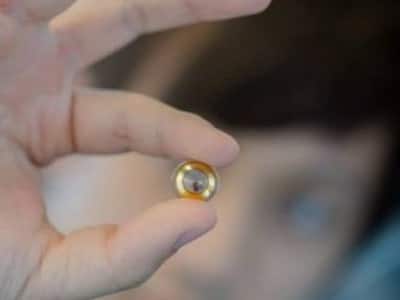
 Medella Health, of Waterloo, Ontario has won the national leg of the James Dyson Award, meaning that they will now advance to the international competition representing Canada, with its non-invasive glucose monitoring Smart Contact Lens Platform, designed for people living with diabetes.
Medella Health, of Waterloo, Ontario has won the national leg of the James Dyson Award, meaning that they will now advance to the international competition representing Canada, with its non-invasive glucose monitoring Smart Contact Lens Platform, designed for people living with diabetes.
The Medella team, made up of University of Waterloo students Harry Gandhi, Huayi Gao and Maarij Baig, also wins a $4,000 prize.
Their Smart Contact Lens measures blood levels in tear film, and then sends that information to a user’s mobile phone so that they can monitor glucose levels throughout the day.
“Growing up a fan of science fiction, I was always intrigued by exploring the unknown with technology,” says co-founder Huyai Gao. “And only during a high fever, I realized how little we actually know about what’s going on inside our body. A smart contact lens can not only help monitor our health, but also display it in real time for us to see. As we explore this vast unknown territory of human health bit by bit, we can eventually start to take preventative measures.”
The team’s Smart Contact Lens is the result of a fourth year design project at the University of Waterloo in 2013.
The team hopes to embed their system into lenses by the end of 2016 and to have a fully functional and wearable lens ready for testing by the fall of 2017.
One in 10 Canadians has diabetes, a condition characterized by having high blood sugar. Currently, diabetics monitor their blood glucose levels by pricking their finger and drawing blood, an invasive process that can lead to low compliance rates.
By embedding that process in a Smart Contact Lens, the students have created a non-invasive solution that detects glucose in micro-molecular concentrations with a non-enzymatic sensor composed of nanomaterials.
The power source for the platform comes from a reader device that wirelessly transfers energy to the antenna in the lens.
The lens communicates with a mobile device through an integrated circuit composed of a chip and antenna embedded in the contact lens that converts analogue data into digital data.
The students believe that the device will operate at a lower cost than other glucometers currently on the market, not to mention that its glucose sensors last for 30 days, compared to others that last for one or two days.
Medella Health plans to offer their lens for $2,500 per year, on a monthly subscription model, compared to the $1,500 to $4,000 annual average that North Americans currently spend on invasive glucose monitoring.
Although their focus is on diabetes management right now, the Medella team hopes to expand monitoring capabilities to other biomarkers in the future, ranging from heart disease to stress levels.
The international winner of the 2016 James Dyson Award will be announced on October 27, with the top prize being $60,000 for the student and $10,000 for the student’s university department, with the runner-up prizes being $10,000 each.
In June, Medella Health raised a $1.4 million seed round through 1517 Fund, Fifty Years Fund, Garage Capital, BDC Capital and other investors.
The global winners of last year’s James Dyson Award was Voltera, also from the University of Waterloo, who took the top prize for their Voltera V-One circuit board printer, marking the first time a Canadian team had ever won the Award since its founding in 2002.
Comment
One thought on “Waterloo students win national James Dyson Award for smart contact lens”
Leave a Reply
You must be logged in to post a comment.





 Share
Share Tweet
Tweet Share
Share




why a “mobile phone.” Why not a “portable computer.” It’s time to take the phone out of a smartphone, it’s just a computer.